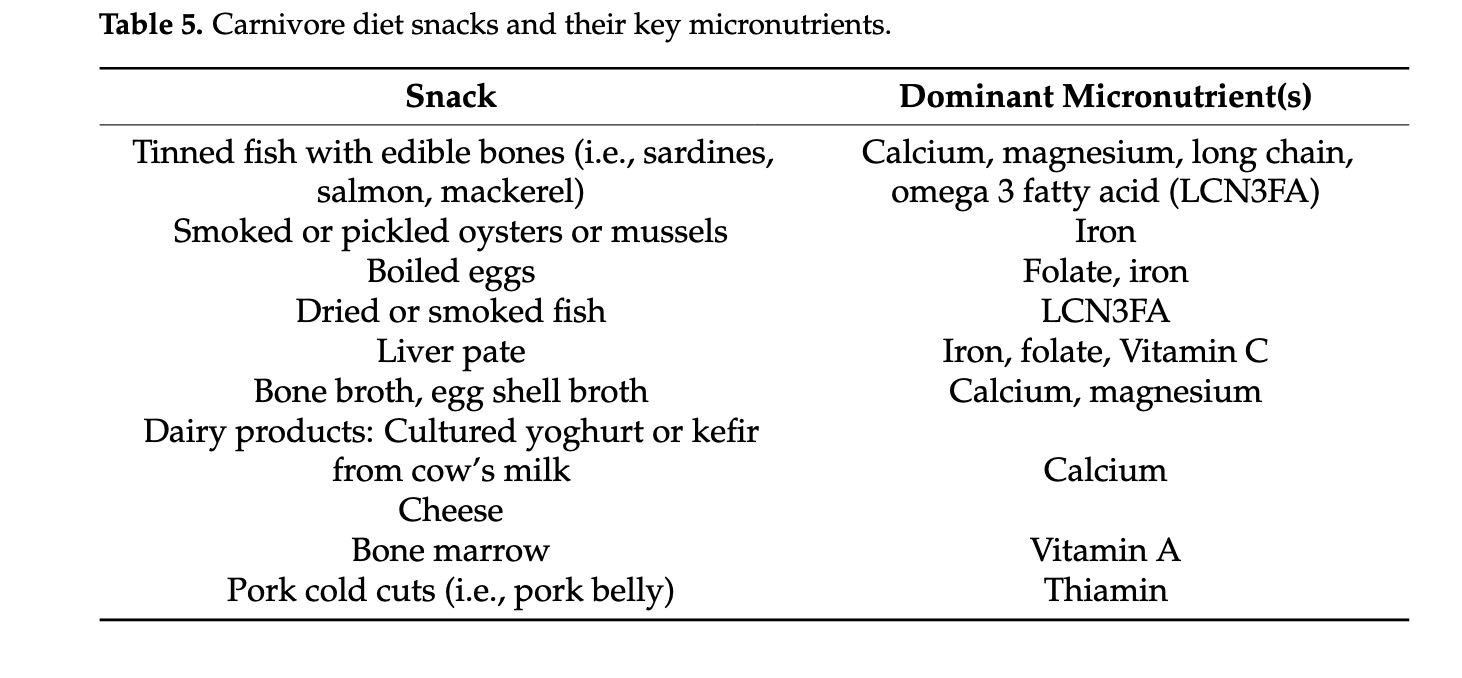Basically they took the AU/NZ recommended food plans and compared them to 4 carnivore formulations using a much fancier version of software like cronometer; So this is just a paperwork study against guidelines.
While there is a substantial body of literature to support the benefits of carbohydrate reduction on metabolic health [4], claims surrounding additional anti-inflammatory benefits following the elimination of plant-based foods have not been founded by peer-reviewed literature.
Sounds like a research opportunity!
To date, research examining the contemporary carnivore diet is extremely limited
Green pasture (heh) research field!
Participants indicated that following a diet pattern with minimal to no plant matter led to resolution or improvement in a range of chronic conditions, including overweight/obesity, diabetes/insulin resistance, gastrointestinal conditions, and dermatologic conditions after following a completely animal-based diet
Diets which exclude grain-based foods are frequently criticised for being inadequate in essential B-vitamins. Whist riboflavin, niacin, Vitamin B6, and Vitamin B12 were consistently sufficient across the meal plans, thiamin (Vitamin B1) was consistently insufficient. Thiamin is a water-soluble vitamin that is used in the body as a co-factor for cellular energy metabolism
With inadequate thiamin, carbohydrate metabolism is impaired, resulting in the accumulation of pyruvate and lactate, which presents as intense vasodilation, elevated cardiac output and cardiac enlargement, and oedema
But... in a carnivore context, which is nearly zero carbohydrate, this may not be a actual issue as seen in previous studies.
A relationship between carbohydrate intake in the diet and thiamin requirements is well documented,
Worth noting that the consumption of pork will provide Thiamin
Without adequate planning/consideration, folate is another B-vitamin that could be inadequately consumed following a strict carnivore diet
(It can be provided if the carnivore meal plan accounts for it).
the folate requirements may be sufficiently met by including liver and eggs
Yeah, so a well formulated carnivore meal plan is organ meats not just muscle. Liver + Eggs!
Vitamin C is particularly interesting to discuss in the context of a carnivore diet. O’Hearn [14] presented empirical evidence and plausible mechanisms which could explain the apparent absence of Vitamin C deficiency diseases (scurvy) among groups of people consuming a largely animal based/carnivore diet.
We discussed the O'Hearn paper already in a previous post.
Despite being a poor source of Vitamin C, meat is recognised for having antiscorbutic (scurvy-preventing) properties
4.3. Electrolytes: Calcium, Magnesium, Potassium, and Sodium.....due to there being multiple mechanisms through which calcium, magnesium, and potassium homeostasis is regulated (i.e., intestinal absorption, renal re-absorption/excretion, and bone resorption), acute deficiency diseases are uncommon
The potassium discussion is interesting, their food plans don't include blood (cooked or raw), which can be a source of ASF potassium
Plant-sourced phytates, polyphenols, tannins, and oxalates in the gut lumen reduce iron bioavailability [40]. Animal-sourced haem iron also has greater bioavailability than non-haem plant sources.
By completely excluding plants, the carnivore diet provides zero dietary fibre. There is no estimated average requirement (EAR) or RDI for dietary fibre;
One postulated benefit coming from the exclusion of fibre in the carnivore diet is a significant reduction in antinutrients. Antinutrients include lectins, oxalates, phytates, phytoestrogens, and tannins [41]. They are thought to restrict the bioavailability of various nutrients, and if absorbed in excess, may disrupt various physiological processes. For example, oxalate hyperabsorption, which occurs more commonly in individuals with gastrointestinal disorders, is associated with the formation of oxalate kidney stones [42]. Phytate, which is found in cereal grains, nuts, seeds, and legumes, acts as a strong chelator of mineral cations, impeding the bioavailability of copper, zinc, and iron in the diet [41]. Given that fibre and plant-sourced antinutrients compete with mineral absorption [43,44], it is plausible that not consuming plants could lead to lower net requirements of those nutrients.
Based on our analysis, individuals following a carnivore diet may consider supplemental fibre intake to achieve the AI, however, dietary fibre may not be necessary in all cases and, theoretically, could off-set some of the intended effects of the diet itself.
Finally, the metabolic health implications of a carnivore diet remain a topic of significant debate.
THAT IS A UNDERSTATEMENT
Basically, if your starting off in poor health taking supplements may be a good idea; If your not eating tip-to-tail (organ meats like liver), then supplements may be a good idea.
If your having any issues, map out your diet using a tool like cronometer to make sure your covering your requirements.
TLDR - Learn to love liver.
